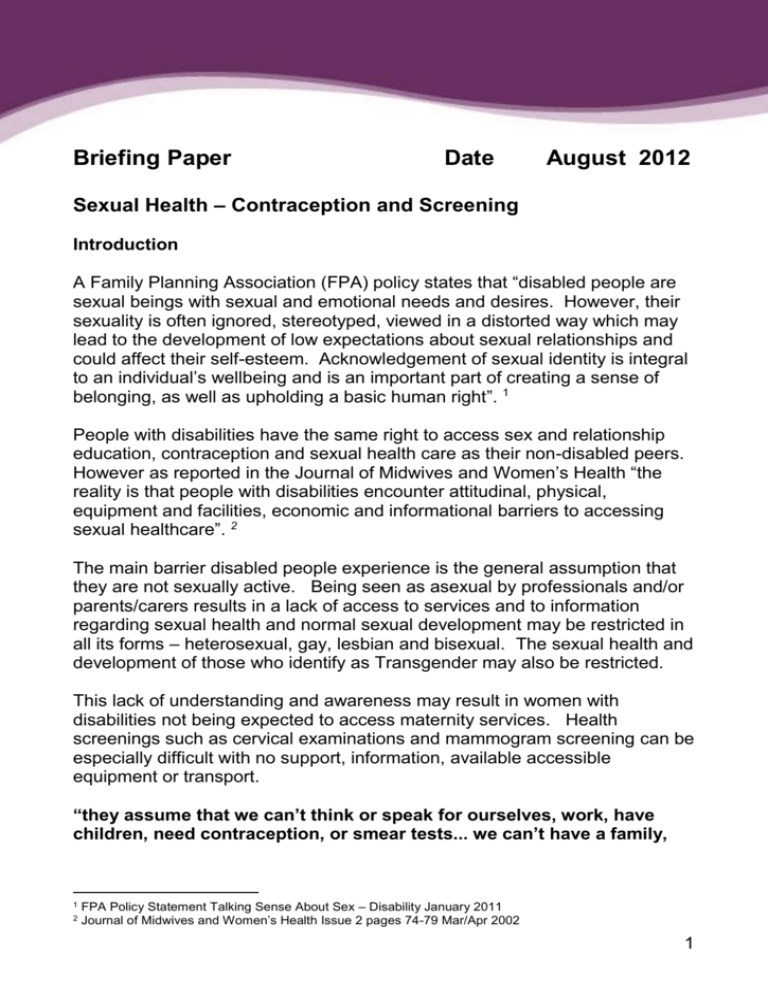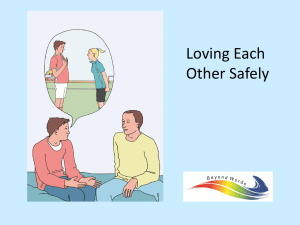
Briefing Paper
Date
August 2012
Sexual Health – Contraception and Screening
Introduction
A Family Planning Association (FPA) policy states that “disabled people are
sexual beings with sexual and emotional needs and desires. However, their
sexuality is often ignored, stereotyped, viewed in a distorted way which may
lead to the development of low expectations about sexual relationships and
could affect their self-esteem. Acknowledgement of sexual identity is integral
to an individual’s wellbeing and is an important part of creating a sense of
belonging, as well as upholding a basic human right”. 1
People with disabilities have the same right to access sex and relationship
education, contraception and sexual health care as their non-disabled peers.
However as reported in the Journal of Midwives and Women’s Health “the
reality is that people with disabilities encounter attitudinal, physical,
equipment and facilities, economic and informational barriers to accessing
sexual healthcare”. 2
The main barrier disabled people experience is the general assumption that
they are not sexually active. Being seen as asexual by professionals and/or
parents/carers results in a lack of access to services and to information
regarding sexual health and normal sexual development may be restricted in
all its forms – heterosexual, gay, lesbian and bisexual. The sexual health and
development of those who identify as Transgender may also be restricted.
This lack of understanding and awareness may result in women with
disabilities not being expected to access maternity services. Health
screenings such as cervical examinations and mammogram screening can be
especially difficult with no support, information, available accessible
equipment or transport.
“they assume that we can’t think or speak for ourselves, work, have
children, need contraception, or smear tests... we can’t have a family,
1
2
FPA Policy Statement Talking Sense About Sex – Disability January 2011
Journal of Midwives and Women’s Health Issue 2 pages 74-79 Mar/Apr 2002
1
we have a disability, I am not a non person, they treat us as non
persons.” 3
The absence of men and women with disabilities, within the system, may
account for the lack of knowledge among health care professionals and the
lack of staff training.
The above circumstances are substantiated by the Department of Health’s
(GB) findings that data on the sexual health of people with disabilities is
limited and that disability is not currently in any of the national datasets on
sexual health.4
Contraception
There is limited research into the contraceptive care of people with disabilities
as well as a lack of clinical guidelines on contraceptive methods for use by
people with a range of disabilities and conditions.
Barriers to contraception may be threefold - structural, attitudinal and
knowledge based.
Women with disabilities experience two extremes of service, they are either
not offered contraception or are given enforced permanent contraception by
hysterectomy or sterilisation.
Heather Becker 5 found in a study of reproductive health care that “providers
sometimes appeared surprised that disabled women would be sexually active
and did not ask about contraception use or assess for sexually transmitted
diseases”.
This position could be contrasted with people with learning disabilities who
may be given contraception with no information. Michelle McCarthy in recent
research suggested “that there is the ‘just in case’ approach to contraception
where woman with learning disabilities who are not sexually active are given
3
Harper C, McClenaghan S, Russell H and Bryne B (2012) Monitoring implementation (public policy and
programmes) of the UNCRPD in Northern Ireland. ECNI see
http://.equalityni.org/archive/pdf/UNCRPDFullReportFinal260112.pdf#search=”harper” (Website last access
March 2012)
4 Equality Impact Assessment for National Sexual Health Policy January 2010 Department of Health
www.dh.gov.uk/publications
5 Reproductive Health Care Experience of Women with Physical Disabilities: A Qualitative Study. Arch
Physical Medical Rehabilitation Vol 78 1997
2
contraception. A balance between protection and empowerment must be
achieved as there is a need to establish choice and control by disabled
women over their own contraception”. 6
In some cases the burden that administering contraception places on
overstretched families and carers can lead to unnecessary sterilisation or
hysterectomies. 7 Such cases raise the issue of breaches of human rights.
Contraception information and family planning services form an essential part
of both men and women’s lives. Sex education is fundamental to a young
disabled persons’ sexual and emotional development. Forthcoming research
from Disability Action and Rainbow,8 suggests that if relationship and sexual
education is taught in special schools it is related to appropriateness, safety
and protection and has little in relation to choices and human rights9.
Therefore in the interests of future protection young people with disabilities
are not informed about meaningful relationships with the result they too see
themselves as non-sexual.
John is 20 years old and has a mild to moderate learning disability. He went
to a mainstream primary school and states that in P7 his class got a talk on
health, contraception and relationships. He then transferred to a special
school where he was given no sexual health information. He was sexually
active from age 15 and had a sexual information talk from his father. Before
this he got his information from friends. At age 17 John went to a further
education college where he received information from HYPE 10 who gave the
class a talk on STI, contraception and drug awareness. John said that no
mention was made of LGB&T relationships except for an anti-bullying
message. John believes that he will raise a family.
NDA research found that “disabled lesbians, gay men or bisexuals also lack
access to appropriate sex education and health information, which is needed
6
NHS Evidence http://www.library.nhs.uk/learningdisabilities/viewresource.aspx?resID
Women with Disabilities Australia Policy and Position Paper: The Development of Legislation to Authorise
Procedures for the Sterilisation of Children with Intellectual Disabilities
8 www.rainbow-project.org
9 See for example Knowing and Growing KS3 ‘My Body
http://www.nicurriculum.org.uk/inclusion_units/severe_learning_difficulties/knowing_growing/index.asp
10 HYPE Lawther Buildings 16 Cupar Street Belfast BT12 2LJ
7
3
but cannot be gained through the avenues of formal education or through the
wider lesbian, gay and bisexual community”.11
A Public Health Agency and FPA Factsheet, detailing findings from sexual
health research, reports that many people with learning disabilities are able
and willing to talk about sexual health but have limited opportunities to do so.
They reported limited experience of sexual expression and highlighted the
restrictions that carers and staff place on people with learning disabilities.
Some staff forbade them from having partners and think they should not be
sexually active.12
Screening
The Disability Discrimination Commission’s13 research (2004) found that
fewer than 20% of women with a learning disability attend cervical screening
and people with learning disabilities are four times more likely to die as a
result of a preventable condition.14
The following is a Case Study that Disability Action is aware of through its
membership.
Donna is 61, single and a wheelchair user. She did ask her doctor, quite a
few years ago, about having a cervical smear as all her sisters were having
them. However was told, by her GP, that as she was not sexually active
there was no need. It was never mentioned again.
“It is hard for me to get any kind of screening”
On reaching 50 years Donna did receive a letter inviting her onto the over
50’s breast screening programme. She rang the clinic and explained that due
to her disability she could not stand for the x-ray. She was asked to keep her
appointment and was given an ultra sound instead. A lump was discovered
on examination which was benign.
11
Disability and Sexual Orientation A Discussion Paper: National Disability Authority, Ireland
FPA and Public Health Agency Factsheet 1 Sexual Health and people with learning disabilities
13 Disability Discrimination Commission responsibilities transferred to Equality and Human Rights
Commission 1 October 2007
14 http://news.bbc.co. uk/1/health/4081773
12
4
In Donna’s case it could be argued that her GP’s judgement created the lack
of access to the cervical screening programme, whereas the universal
invitation to the breast screening programme provides equality of opportunity,
choice and control and is an example of a reasonable adjustment working in
practice.
NHS Salford recently launched a monthly clinic following feedback that
women with disabilities were unhappy about having to go to the hospital to
have their smear tests. A range of barriers faced these women – there were
no ramps to get into the practice, hoists to help, or no loop systems. 15
This community based service could be used as model of good practice for
other health centres.
There is no research available regarding men with disabilities and health
screening, for example, for prostate cancer.
Recommendations
Research
- Department of Health Social Services and Public Safety (DHSSPS)
must scope the gaps in knowledge and service provision in regard
to the contraceptive and health care screening rights of disabled men
and women across categories (including multiple identities)
- DHSSPS must develop sexual health policies and guidance for all
stakeholders working with disabled men and women
- Department of Education (DE) must carryout a thematic study of the
teaching and guidance of school relationship and sexual education
modules and consult with a range of stakeholders
Information
- Accessible, age appropriate, information and resources must be
provided by DHSSPS in a range of formats to enable men and women
with disabilities to make informed choices about contraception and
screening including easyread
15
www.salford-pct.nhs.uk
5
- DHSSPS must develop and deliver an awareness raising programme
for men and women with disabilities on the availability of contraception
and screening services
- DHSSPS must develop an awareness raising programme for men and
women with disabilities to translate knowledge into practice
- DHSSPS must provide accessible information and awareness raising
for families and carers on the availability of contraception and screening
services
Training
- DHSSPS must provide Disability Equality Training at all levels of Health
Care Professionals and non medical staff including training in managing
and communicating with people with disabilities
- DHSSPS training should be developed for professionals in health care
on physical equipment and environment, information/communication
- DE to provide Disability Equality Training for teachers/non teaching staff
in mainstream and special schools
- DHSSPS and DE must introduce staff education programmes, based
on the social model of disability, to effect attitudinal change in health
and education sectors
- DHSSPS and DE must ensure that Training content includes multiple
identity issues for example age, LGB&T
Engagement
- DHSSPS must ensure the involvement of disabled people and their
representative organisations in the design and delivery of DET modules
- Department of Education must ensure the involvement of disabled
people and their representative organisation in the design and delivery
of DET modules
6
- DHSSPS and DE must ensure men and women with disabilities
participation in planning, delivery and evaluation of services
- The health care profession, as a lead partner, must establish and
maintain links with all stakeholders
- DE must ensure that young people with disabilities are consulted on
Special Schools Sexual Health Education Programme
August 2012
For further information please contact us:
Disability Action
Portside Business Park
189 Airport Road West
Belfast
BT9 3ED
Telephone:
Fax:
Textphone:
Email:
Website:
028 9029 7880
028 9029 7881
028 9029 7882
marketing@disabiliityaction.org
www.disabiliityaction.org
This document is available in a range of formats please contact us with your
requirements.
7









